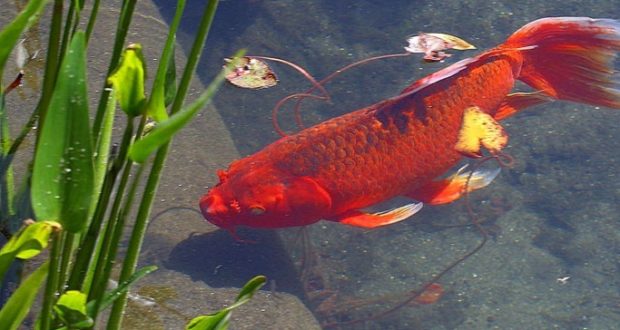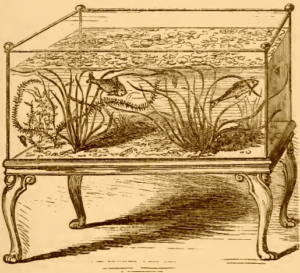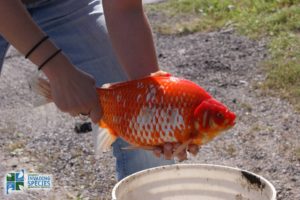
Here at That Fish Place – That Pet Place we are doing our best to educate our customers on the dangers and risks of using goldfish as bait. In addition to offering an extreme risk to native species, anglers also face steep fines if they are caught in possession of goldfish for bait. In Lancaster County Pennsylvania, where we are located, there are several bait and tackle shops that offer better alternatives for fishing.
History of Goldfish in the US

A western aquarium of the 1850s illustration from Shirley Hibber, The Book of the Aquarium and Water Cabinet
Goldfish are freshwater members of the carp and minnow family. While many of us admire them from the view of our tank, they are actually one of the first aquatic invasive species to reach North America. How did the goldfish go from being the cute googly eyed fish you would feed after school, to being such a widespread risk to native plants and species?
Goldfish began to come to the America’s in the 1600s as ornamental fish for aquariums and water gardens. If the fish became too large for their surroundings, or the owner became tired of it, they simply got rid of it in the closest freshwater source. Today, goldfish are becoming reintroduced as livebait. Pennsylvania has stepped in, as well as many other states to make it illegal to use goldfish as live bait.
The Real Issues

Goldfish (Carassius auratus) photo by Ontario Streams
Goldfish will typically eat their own eggs when held in captivity, so breeding is not a large issue for most hobbyists unless they are intentionally breeding their goldfish. Given the right conditions, goldfish can spawn several times a season. A lot of the eggs will get eaten by the adult goldfish once they are laid, but several hundred eggs are produced at each spawning. With only a few eggs eaten, and fry hatching within 48-72 hours, you can imagine how just a few goldfish can turn into a large problem rather quickly.
Often referred to as the “little piggies” of the aquarium, goldfish are opportunistic feeders and will not stop eating of their own accord. While goldfish typically feed off of crustaceans, insects, and various plant matter; when this food is scarce they will eat eggs from native species nests. The native egg-laying species populations have now been disrupted, and due to that, the population has declined and disrupted other wildlife food chains.
Law on the Books
 It is unlawful to use or possess goldfish, comets, koi and common carp as bait fish while fishing in the state of Pennsylvania. If you are caught fishing with feeder goldfish or any other illegal bait fish there is a minimum $120.50 fine, and you can be fined an additional $20.00 – $50.00 per illegal bait fish. Pennsylvania Fish & Boat Commission wants you to know that you aren’t off scot-free just yet. Law enforcement also has the authority to confiscate or seize, any fishing equipment as evidence of your violation of the law. The Pennsylvania Fish & Boat Commission may, upon proper notice, suspend or revoke your fishing privileges, boating privileges or other permits of any person convicted (or acknowledging guilt) of a violation of the Fish and Boat Code or Fish & Boat Commission regulations. That would also include your naive fishing buddy. Should multiple violations occur within a 12-month period you will be given a fine of $200 in addition to the previously mentioned summary offenses. That $0.10 feeder fish now cost you a fishing license, a fishing rod, fishing equipment, a whole lot of cash, a boat, and a fishing buddy. The consequences per state will vary, so check with your local Fish & Boat Commission for more information.
It is unlawful to use or possess goldfish, comets, koi and common carp as bait fish while fishing in the state of Pennsylvania. If you are caught fishing with feeder goldfish or any other illegal bait fish there is a minimum $120.50 fine, and you can be fined an additional $20.00 – $50.00 per illegal bait fish. Pennsylvania Fish & Boat Commission wants you to know that you aren’t off scot-free just yet. Law enforcement also has the authority to confiscate or seize, any fishing equipment as evidence of your violation of the law. The Pennsylvania Fish & Boat Commission may, upon proper notice, suspend or revoke your fishing privileges, boating privileges or other permits of any person convicted (or acknowledging guilt) of a violation of the Fish and Boat Code or Fish & Boat Commission regulations. That would also include your naive fishing buddy. Should multiple violations occur within a 12-month period you will be given a fine of $200 in addition to the previously mentioned summary offenses. That $0.10 feeder fish now cost you a fishing license, a fishing rod, fishing equipment, a whole lot of cash, a boat, and a fishing buddy. The consequences per state will vary, so check with your local Fish & Boat Commission for more information.
The employees at That Fish Place – That Pet Place are all avid hobbyists, and a lot of us live in the local river towns where fishing is just a way of life. We don’t want to ruin the sport for other enthusiasts, just as much as we don’t want others to ruin the sport for us. We will always strive to do our best when it comes to conservation efforts, and want to encourage others to do the same. Thank you for reading!







